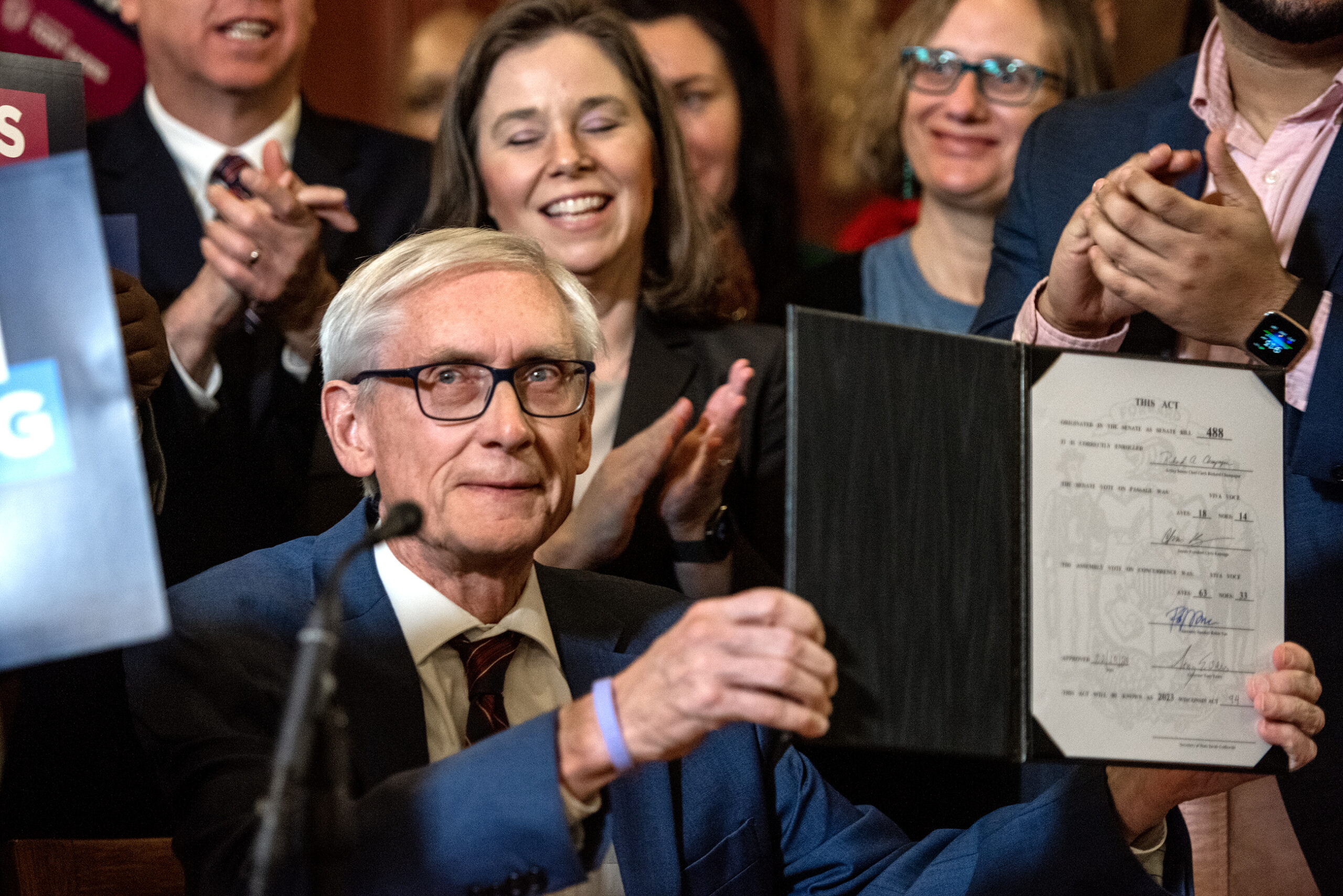Gov. Tony Evers is expected to take action on the state budget this week, but how he may use his powerful veto pen to change the two-year spending plan remains unclear.
According to the governor’s office, Evers, a Democrat, officially received the state budget from the GOP-controlled Legislature on Friday. Under state law, he has six days, excluding Sunday, from receiving the budget to act on it. His actions could range from signing the plan with no changes — something Republicans have called for — to vetoing the entire budget, or using his veto pen to make changes, a process known as a partial veto.
Speaking with reporters on Tuesday, the governor said he wouldn’t comment on his plans, but noted “there’s a large amount of money in the budget for tax cuts,” adding that his veto pen could “balance that out.” He also called the budget’s funding for K-12 schools “inadequate.”
Stay informed on the latest news
Sign up for WPR’s email newsletter.
“We’re going to be spending just about every waking moment over the next couple days figuring out what our position will be on that,” he said of the budget signing. “So, stay tuned.”
Governor’s Veto Power Is Wide-Ranging
Evers has one of the most powerful veto pens in the country, with the ability to delete words, numbers and punctuation from the budget. According to a 2020 memo from the Legislature’s nonpartisan research office, most other governors are limited to eliminating or reducing spending amounts in budget bills. In contrast, the Wisconsin governor can make changes to any part of the budget, including policy language.
For example, in his partial vetoes of the last state budget, Evers vetoed a required study of state Capitol building security that could have been made public. He cited security concerns related to making the study publicly available, and instead directed Capitol Police to review and update policies internally. There was no state funding associated with the study.
The governor’s partial veto powers include:
- The “digit veto,” where a governor deletes one digit of a number to change an appropriation amount. For example, Evers used his digit veto in the last budget to reduce a requirement that the Medical College of Wisconsin raise $85 million in outside support before getting state funding. He deleted one “0” in the requirement, to reduce the college’s outside funding threshold to $8.5 million.
- The “editing veto,” in which a governor can delete a word or words from the spending plan. In the last budget, Evers deleted the mention of a specific organization named in the budget to receive a $100,000 grant for suicide prevention services. Instead, he said the state Department of Health Services should oversee the grant program and choose the recipient of the funding.
- The “write down veto,” in which a governor can decrease a funding amount. In the last budget, Evers reduced funding for drug testing food stamp recipients in Wisconsin, because he objects to such testing.
The most notable partial veto in the last budget was Evers’ move to increase school funding by $65 million. The governor accomplished the spending bump by increasing per-pupil aid in Wisconsin by $63 per student in each of the budget’s two years.
New Limits Could Affect This Year’s Vetoes
While powerful, the governor’s veto authority is certainly not unlimited. Over the past few decades, several new parameters have been set on the gubernatorial veto pen, including blocks on the so-called “Vanna White veto” and “Frankenstein” veto. Those partial veto moves were barred by constitutional amendments in 1990 and 2008, respectively.
- With the “Vanna White veto,” named after the famous “Wheel of Fortune” game show host, previous governors were allowed to eliminate individual letters in words to create new words. According to the Legislatve Reference Bureau, a notable use of this veto came from former Gov. Tony Earl in 1983, when Earl partially vetoed a paragraph of 121 words to create a new paragraph with just 22 words.
- Using the “Frankenstein veto,” previous governors could eliminate words from separate sentences to combine and make new sentences. According to the Reference Bureau, former Gov. Jim Doyle used that partial veto tactic in 2005 to piece 20 words together from a section of text that was previously more than 750 words. With the new language, Doyle transferred $427 million from the state’s transportation budget to its general fund.
A decision by the Wisconsin Supreme Court last year, in a case brought by a conservative advocacy group, could also limit the governor’s veto power this time. That decision struck down three of the Evers’ 2019 budget vetoes. The struck-down vetoes would have shifted funding for school buses to electric vehicle charging stations, changed the definition of “vapor products” and redefined who qualified for funding under a local road improvement fund.
Though a majority of justices on the court agreed those three vetoes went too far and exceeded the governor’s authority, they couldn’t agree on a majority-backed definition of why those vetoes were problematic or how a governor may overstep his or her proper veto authority in the future.
According to the Legislative Reference Bureau, the fractured decision did serve, however, to solidify a requirement that partial veto power cannot be used to change the subject of a particular section of the budget — in other words, the text that remains after a veto must still be about the original topic or subject.
GOP-Controlled Legislature Crafted Budget With Eye On Limiting Big Vetoes
According to Republican leaders, the 2021-2023 budget was strategically written to limit Evers from making any big policy changes with his veto pen.
Speaking with reporters last week, state Senate Majority Leader Devin LeMahieu, R-Oostburg, said the GOP majority worked to create a budget that would give Evers little to work with.
“The intent of the finance committee was to produce a budget that had very few new policies, new programs, very few words involved,” LeMahieu said.
In the past, lawmakers have moved to include major policy items in the budget, particularly during the final stages of the budget committee process. In 2015, those last-minute changes included limits on public access to government records. Those changes were ultimately removed from the budget.
No such last-minute additions were made to the budget this year.
Wisconsin Public Radio, © Copyright 2024, Board of Regents of the University of Wisconsin System and Wisconsin Educational Communications Board.






